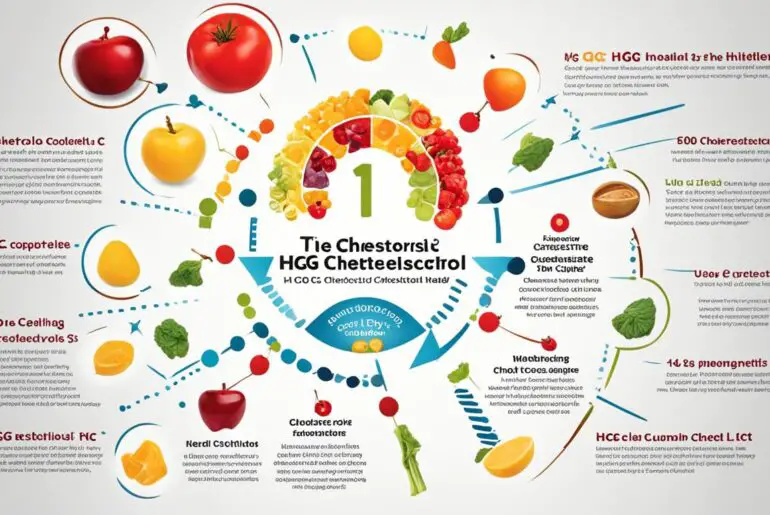Are you tired of yo-yo dieting and searching for a solution that promises long-term weight maintenance? Look no further. In this article, I will delve into the controversial HCG diet and its effectiveness in achieving lasting results. Is the HCG diet truly a game-changer or just another fad? Let’s find out.
Key Takeaways:
- The HCG diet involves severe calorie restriction, but its safety and effectiveness are questionable.
- The FDA advises against using over-the-counter HCG products for weight loss due to potential risks.
- Gradually increasing calorie intake, adopting healthy eating habits, and maintaining an exercise routine are key for weight maintenance.
- Professional guidance from healthcare providers or registered dietitians is crucial for successful weight management.
- Building sustainable habits and making lifestyle changes contribute to long-term weight maintenance and overall well-being.
The Safety and Efficacy of the HCG Diet
The HCG diet has gained popularity as a weight loss solution, but it is important to understand the safety and efficacy of this approach. The FDA has expressed concerns about the use of over-the-counter HCG products for weight loss, as there is insufficient evidence to support their effectiveness and safety.
HCG, or human chorionic gonadotropin, is a hormone produced during pregnancy. While it is used as a prescription medication for fertility issues, it is not approved for weight loss purposes by the FDA.
The HCG diet typically involves severe calorie restriction, with daily intake ranging from 500 to 800 calories. Although this approach may result in short-term weight loss, it also poses risks to health and well-being.
Some potential risks associated with the HCG diet include:
- Gallstone formation
- Irregular heartbeat
- Nutrient deficiencies
- Electrolyte imbalances
There have been reports of side effects such as fatigue, irritability, depression, fluid buildup, and an increased risk of blood clots. These risks highlight the importance of consulting with a healthcare provider before starting any weight loss program.
It is crucial to prioritize safe and sustainable weight loss strategies. Rather than relying on extreme calorie restriction, focusing on a balanced diet and regular physical activity is key to achieving long-term weight management.
Consulting with a healthcare provider or registered dietitian can provide personalized guidance and support in developing a healthy and effective weight loss plan. Their expertise can help individuals navigate the challenges of weight loss while minimizing potential risks.
Remember, when it comes to weight loss, a sustainable approach that prioritizes overall health is always the best choice.
Maintaining Weight After the HCG Diet

Many individuals struggle with maintaining their weight after completing the HCG diet. This is because the HCG injections and strict calorie restriction during the diet may cause the body to enter a starvation mode, leading to weight regain once normal calorie intake resumes.
To maintain weight after the HCG diet, it is important to gradually increase calorie intake and avoid abrupt changes that may confuse the body. Start by increasing calorie intake by 200 kcal per week until reaching a healthy daily intake, such as 1500 kcal.
It is also crucial to reintroduce a balanced and varied diet, including sugars and starchy foods, but in moderation. This will ensure that the body receives all the necessary nutrients for optimal health while preventing overconsumption.
Establishing an exercise routine is equally important for long-term weight maintenance. Engaging in regular physical activity, such as cardio and resistance exercises, for at least 75 minutes per week can help maintain weight loss and promote a healthy lifestyle.
“Maintaining weight after completing the HCG diet requires a gradual increase in calorie intake and the adoption of healthy eating habits and exercise routines. This approach allows the body to adjust gradually without entering a starvation mode, reducing the risk of weight regain and promoting long-term weight maintenance.”
The Importance of Gradual Calorie Increase
Gradually increasing calorie intake after the HCG diet allows the body to adapt to a higher calorie level without triggering the starvation mode. This approach helps maintain metabolic functions, prevents weight regain, and promotes sustainable weight management.
Adopting Healthy Eating Habits
Reintroducing a balanced and varied diet is crucial for long-term weight maintenance after the HCG diet. This includes incorporating sugars and starchy foods in moderation while focusing on nutrient-rich options such as fruits, vegetables, lean proteins, and whole grains. Practicing portion control and mindful eating can also contribute to maintaining a healthy weight.
Establishing an Exercise Routine
An exercise routine consisting of both cardiovascular exercises and strength training is essential for maintaining weight loss and promoting a healthy lifestyle. Engaging in regular physical activity not only burns calories but also improves metabolism, builds lean muscle mass, and enhances overall fitness.
Reaping the Benefits of Long-Term Weight Maintenance
- Reduces the risk of obesity-related health issues
- Improves cardiovascular health
- Enhances energy levels and mood
- Promotes overall well-being and quality of life
By gradually increasing calorie intake, adopting healthy eating habits, and establishing an exercise routine, individuals can maintain weight loss achieved after the HCG diet and enjoy the benefits of long-term weight maintenance.
The Role of Calorie Intake in Weight Maintenance
Calorie intake plays a crucial role in weight maintenance. To maintain a healthy weight, it is important to consume an appropriate number of calories that meet the body’s needs.
The recommended daily calorie intake can be calculated by multiplying one’s weight by 13. This calculation provides a general guideline for calorie consumption, but individual factors such as age, gender, activity level, and metabolism may influence the specific calorie requirements.
After completing the HCG diet period, it is essential to gradually increase calorie intake to avoid triggering the body’s starvation mode. Abruptly returning to normal calorie consumption can lead to weight regain and disrupt the metabolism. By gradually increasing calorie intake and allowing the body to adjust, weight maintenance becomes more sustainable.
Adopting a balanced and varied diet is key to healthy weight management. A balanced diet includes all essential nutrients such as carbohydrates, proteins, fats, vitamins, and minerals. Each nutrient plays a unique role in the body’s functions and overall well-being.
- Carbohydrates provide energy for daily activities and bodily functions. They can be found in foods such as whole grains, fruits, and vegetables.
- Proteins are responsible for building and repairing tissues, including muscles. Good sources of protein include lean meats, fish, legumes, and dairy products.
- Fats are essential for hormone production, insulation, and energy storage. Healthy sources of fats include avocados, nuts, seeds, and olive oil.
- Vitamins and minerals are necessary for various bodily functions, including immune system support and cellular communication. They are abundant in fruits, vegetables, whole grains, and dairy products.
Portion control and mindful eating are important strategies for maintaining a healthy weight. By being aware of portion sizes and tuning into hunger and fullness cues, individuals can prevent excessive calorie consumption and make more conscious food choices.
Adequate calorie intake, along with a balanced diet, provides the necessary energy and nutrients to support the body’s functions, support weight maintenance, and promote overall health.
By understanding the role of calorie intake, individuals can make informed choices about their dietary habits and promote long-term weight maintenance.
Importance of Healthy Eating Habits for Long-Term Success

Developing healthy eating habits is crucial for long-term weight maintenance. Instead of relying on strict diets and calorie restriction, it is recommended to focus on consuming nutrient-rich foods in appropriate portions. Incorporating plenty of fruits, vegetables, whole grains, lean proteins, and healthy fats into daily meals can provide essential nutrients for overall health and support weight management. Prioritizing home-cooked meals allows for greater control over ingredients and portion sizes.
“Let food be thy medicine and medicine be thy food.” – Hippocrates
Opting for nutrient-rich foods not only helps in maintaining a healthy weight but also provides vital nutrients that support various bodily functions. Fruits and vegetables are packed with vitamins, minerals, and antioxidants, while whole grains provide fiber and sustained energy. Lean proteins, such as chicken, turkey, fish, and legumes, offer essential amino acids and promote satiety. Healthy fats, like avocados, nuts, and olive oil, contain heart-healthy monounsaturated fats.
The Power of Portion Control
Practicing portion control is key to maintaining a healthy weight. It involves being mindful of serving sizes and listening to your body’s hunger and fullness cues. By allocating appropriate portions for each food group, you can create a well-balanced meal that satisfies both your nutritional needs and your taste buds.
| Food Group | Recommended Portion Size |
|---|---|
| Fruits and Vegetables | 1 cup |
| Grains | 1/2 cup (cooked) |
| Lean Proteins | 3-4 ounces |
| Healthy Fats | 1 tablespoon |
Remember, portion sizes will vary depending on individual needs and activity levels. It is always best to consult with a registered dietitian for personalized guidance.
The Benefits of Mindful Eating
Mindful eating is a practice that involves paying attention to the sensory experiences of eating, such as the taste, texture, and aroma of food. This approach promotes a healthier relationship with food and can prevent overeating. By savoring each bite and eating slowly, you give your body time to register fullness and satisfaction.
- Slow down and chew your food thoroughly.
- Avoid distractions, such as electronic devices, while eating.
- Listen to your body’s hunger and fullness signals.
- Eat when you’re hungry and stop when you’re satisfied.
“Healthy eating is a way of life, so it’s important to establish routines that support your well-being.”
By adopting healthy eating habits, including nutrient-rich foods and practicing portion control and mindful eating, you can achieve long-term success in maintaining a healthy weight. Healthy eating is a way of life, so it’s important to establish routines that support your well-being. Remember to enjoy your meals, nourish your body, and celebrate the many benefits of a balanced and nutritious diet.
The Role of Exercise in Weight Maintenance
Exercise plays a crucial role in maintaining a healthy weight and promoting overall well-being. Regular physical activity helps burn calories, build muscle, improve metabolism, and enhance fitness levels. After completing the HCG diet, it is important to establish an exercise routine that includes both cardiovascular exercises and strength training. This combination helps to maintain weight loss and prevent muscle loss.
To reap the benefits of exercise, aim for at least 75 minutes of vigorous exercise or 150 minutes of moderate exercise per week. This can be achieved through activities such as brisk walking, jogging, swimming, biking, or participating in fitness classes.
Cardiovascular Exercises for Weight Maintenance:
- Brisk walking or jogging
- Cycling or using a stationary bike
- Swimming or water aerobics
- Dancing or Zumba
- Elliptical training
Strength Training for Weight Maintenance:
Strength training is equally important for weight maintenance as it helps build lean muscle mass and boost metabolism. Incorporate exercises that target major muscle groups, such as:
- Squats and lunges for lower body
- Push-ups and chest presses for upper body
- Planks and abdominal exercises for core strength
- Dumbbell or resistance band exercises for overall body strength
“Exercise is not only about weight maintenance but also about improving mental health, reducing stress, and enhancing overall well-being.” – Dr. Lisa Smith
Remember, consistency is key when it comes to exercise. It is important to choose activities that you enjoy and can incorporate into a sustainable fitness routine. By making exercise a regular part of your lifestyle, you can maintain a healthy weight and reap the many benefits that physical activity offers.
Seeking Professional Guidance for Weight Management

When it comes to weight management and achieving long-term success, seeking professional guidance is essential. Consulting with a healthcare provider or a registered dietitian can provide you with the expert knowledge and personalized recommendations you need to reach your goals.
Professional guidance starts with a thorough evaluation of your overall health and individual needs. A healthcare provider or registered dietitian will assess factors such as your medical history, current weight, dietary habits, and lifestyle. This evaluation will help them develop a tailored plan specifically designed for your weight management journey.
One of the key advantages of working with a healthcare provider or registered dietitian is their ability to provide ongoing support and guidance throughout your weight management journey. They can help you navigate the challenges and potential setbacks you may encounter, ensuring that you stay on track and motivated.
A comprehensive approach is often taken when seeking professional guidance for weight management. This includes nutrition education to help you understand the importance of a balanced diet and proper portion control. Additionally, behavior modification techniques can help address any underlying psychological factors that may contribute to unhealthy eating habits.
“Professional guidance is essential for effective weight management and long-term success.”
Registered dietitians, in particular, are experts in the field of nutrition and can provide you with evidence-based dietary recommendations. They can tailor a meal plan that suits your individual needs, taking into consideration any dietary restrictions or preferences you may have.
By working with a healthcare provider or registered dietitian, you can gain the knowledge and tools necessary to make sustainable lifestyle changes. They can help guide you through the transition from the HCG diet to a more balanced and sustainable approach to weight management.
Achieving and maintaining a healthy weight is not just about the number on the scale; it’s about adopting healthy habits that contribute to your overall well-being. Seeking professional guidance ensures that you have the support and expertise necessary to make lasting changes and achieve long-term success in your weight management journey.
Benefits of Seeking Professional Guidance for Weight Management
When you seek professional guidance for weight management, you can benefit from:
- Personalized recommendations based on your individual needs and goals
- Thorough evaluation of your overall health and dietary habits
- A tailored plan designed specifically for your weight management journey
- Ongoing support and guidance to keep you motivated and on track
- Nutrition education and evidence-based dietary recommendations
- Behavior modification techniques to address underlying psychological factors
- A transition from the HCG diet to a balanced and sustainable approach
By harnessing the expertise of healthcare professionals or registered dietitians, you can maximize your chances of achieving and maintaining a healthy weight in the long term.
Sources:
- Mayo Clinic. (2018). Choosing a Registered Dietitian Nutritionist. Retrieved from https://www.mayoclinic.org/healthy-lifestyle/nutrition-and-healthy-eating/in-depth/choosing-a-registered-dietitian-nutritionist/art-20390062
- American Heart Association. (2017). What is Healthy Weight Loss? Retrieved from https://www.heart.org/en/healthy-living/healthy-eating/losing-weight/what-is-healthy-weight-loss
- Academy of Nutrition and Dietetics. (2021). Find an Expert: Are You Looking for a Registered Dietitian Nutritionist? Retrieved from https://www.eatright.org/food/resources/find-an-expert
| Benefits of Seeking Professional Guidance for Weight Management |
|---|
| Personalized recommendations based on individual needs and goals |
| Thorough evaluation of overall health and dietary habits |
| Tailored plan designed specifically for weight management journey |
| Ongoing support and guidance to stay motivated and on track |
| Nutrition education and evidence-based dietary recommendations |
| Behavior modification techniques to address psychological factors |
| Transition from the HCG diet to a balanced and sustainable approach |
The Risks of the HCG Diet and Alternatives

The HCG diet is associated with several risks that individuals should be aware of. These risks include nutrient deficiencies, potential side effects, and a lack of scientific evidence to support its efficacy. While some people may experience short-term weight loss on the HCG diet, the potential dangers outweigh the benefits.
It is important to consider safer and evidence-based alternatives for weight loss and long-term weight maintenance. Adopting a healthy lifestyle that includes a balanced diet, regular exercise, and mindful eating can provide sustainable results without the risks associated with extreme calorie restriction.
Working with healthcare professionals or registered dietitians can be beneficial in developing personalized plans that focus on overall health and well-being, while promoting gradual and sustainable weight loss.
Alternatives to the HCG Diet
When it comes to achieving weight loss and maintaining a healthy weight, there are plenty of alternatives to the HCG diet that are safer and more effective. Here are some proven methods:
- 1. Healthy Eating Habits: Focus on consuming nutrient-rich foods, including fruits, vegetables, whole grains, lean proteins, and healthy fats. Practice portion control and mindful eating to maintain a balanced diet.
- 2. Regular Exercise: Engage in physical activity regularly, such as cardio exercises and strength training. Aim for at least 150 minutes of moderate exercise or 75 minutes of vigorous exercise per week.
- 3. Self-Care and Stress Management: Prioritize self-care activities and manage stress effectively to support overall health and well-being.
- 4. Behavior Modification: Identify and address unhealthy eating habits or emotional triggers that contribute to weight gain. Seek assistance from professionals if needed.
By adopting these alternatives and making healthy lifestyle changes, individuals can achieve sustainable weight loss and long-term weight maintenance without the risks associated with the HCG diet.
| Safer Weight Loss Methods | Key Benefits |
|---|---|
| Healthy Eating Habits | – Provides essential nutrients – Supports overall health and well-being – Allows for a variety of food choices – Sustainable long-term approach |
| Regular Exercise | – Burns calories and builds muscle – Improves metabolism and fitness – Enhances overall health – Promotes sustainable weight maintenance |
| Self-Care and Stress Management | – Supports overall well-being – Reduces emotional eating – Improves mental health – Encourages healthy lifestyle choices |
| Behavior Modification | – Helps identify and change unhealthy habits – Promotes sustainable long-term changes – Addresses emotional triggers and patterns – Provides personalized strategies for success |
The Importance of Sustainable Weight Maintenance
Sustainable weight maintenance is crucial for long-term health and well-being. While crash diets and extreme measures may yield short-term weight loss, they often lead to weight regain and can negatively impact overall health. To achieve lasting results, it is vital to focus on developing healthy habits and making sustainable lifestyle changes.
Adopting a Balanced Diet
An essential component of sustainable weight maintenance is adopting a balanced diet. This means incorporating a variety of nutrient-dense foods such as fruits, vegetables, whole grains, lean proteins, and healthy fats into daily meals. Prioritizing whole foods and limiting processed food consumption can help support long-term weight management.
Engaging in Regular Physical Activity
Regular physical activity plays a pivotal role in sustainable weight maintenance. Incorporating exercise into a daily routine can help burn calories, build muscle, boost metabolism, and improve overall fitness. Aim to engage in at least 150 minutes of moderate-intensity aerobic activity or 75 minutes of vigorous-intensity aerobic activity every week.
Managing Stress and Getting Enough Sleep
Managing stress levels and prioritizing sufficient sleep are integral to maintaining a healthy weight. Chronic stress and lack of sleep can disrupt hormonal balance, leading to weight gain. Incorporating stress management techniques such as meditation, yoga, or deep breathing exercises, combined with consistently getting 7-9 hours of quality sleep each night, can support sustainable weight maintenance.
Practicing Self-Care
Practicing self-care is essential for maintaining a healthy lifestyle and weight. This involves prioritizing activities that promote mental and emotional well-being, such as engaging in hobbies, spending time with loved ones, or practicing mindfulness. Taking care of oneself holistically can help prevent emotional eating and support long-term weight maintenance.
“Sustainable weight maintenance involves making lasting lifestyle changes that prioritize a balanced diet, regular physical activity, stress management, and self-care.”
By focusing on sustainable weight maintenance through healthy habits and positive lifestyle changes, individuals can achieve long-term success in maintaining a healthy weight and overall well-being.
Conclusion
The HCG diet may offer short-term weight loss results, but it is not a safe or sustainable approach for long-term weight maintenance. The severe calorie restriction and potential risks associated with the diet make it a controversial choice. Instead, prioritizing a healthy and balanced lifestyle is crucial for achieving lasting results.
To maintain a healthy weight in the long term, it is important to focus on a nutritious diet, regular exercise, and positive habits. Consulting with healthcare professionals or registered dietitians can provide personalized guidance in developing a sustainable plan. By making gradual and realistic changes, individuals can promote sustainable weight maintenance and overall well-being.
Remember, maintaining a healthy weight is not just about the number on the scale. It is about living a fulfilling and balanced life. Embracing a healthy lifestyle that includes a nutritious diet, regular exercise, and positive habits can contribute to long-term success and overall well-being.
FAQ
What is the HCG diet?
The HCG diet is a weight loss plan that involves severe calorie restriction, typically only 500 to 800 calories per day.
Is the HCG diet safe and effective for weight loss?
The FDA has advised against the use of over-the-counter HCG products for weight loss, as there is no evidence to support their effectiveness and they may have potential risks.
What are the risks associated with the HCG diet?
The risks of the HCG diet include gallstone formation, irregular heartbeat, nutrient deficiencies, electrolyte imbalances, fatigue, irritability, depression, fluid buildup, and the risk of blood clots.
How can I maintain my weight after completing the HCG diet?
To maintain weight after the HCG diet, it is important to gradually increase calorie intake, reintroduce a balanced diet, and establish an exercise routine.
How can calorie intake impact weight maintenance?
Calorie intake plays a crucial role in weight maintenance. It is important to consume an appropriate number of calories that meet the body’s needs.
What are healthy eating habits for long-term weight maintenance?
Healthy eating habits include consuming nutrient-rich foods, practicing portion control, and prioritizing home-cooked meals over processed and fast foods.
How does exercise contribute to weight maintenance?
Regular exercise helps burn calories, build muscle, improve metabolism, and enhance overall fitness. Engaging in both cardiovascular exercises and strength training is important for weight maintenance.
Should I seek professional guidance for weight management?
Yes, consulting with a healthcare provider or registered dietitian can provide personalized recommendations and support for weight management.
What are the risks of the HCG diet and are there safer alternatives?
The risks of the HCG diet include nutrient deficiencies and potential side effects. Safer alternatives for weight loss include adopting a healthy lifestyle that includes a balanced diet and regular exercise.
Why is sustainable weight maintenance important?
Sustainable weight maintenance promotes long-term health and well-being, while crash diets and extreme measures often lead to weight regain and negative health impacts.




